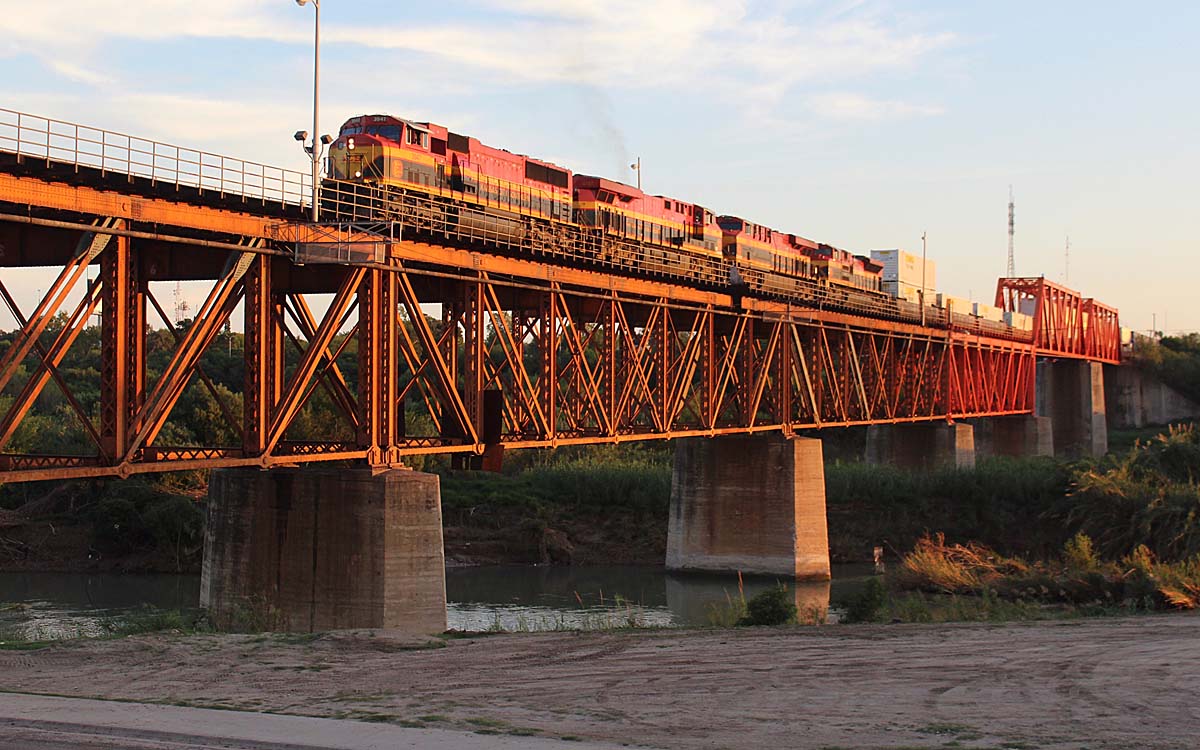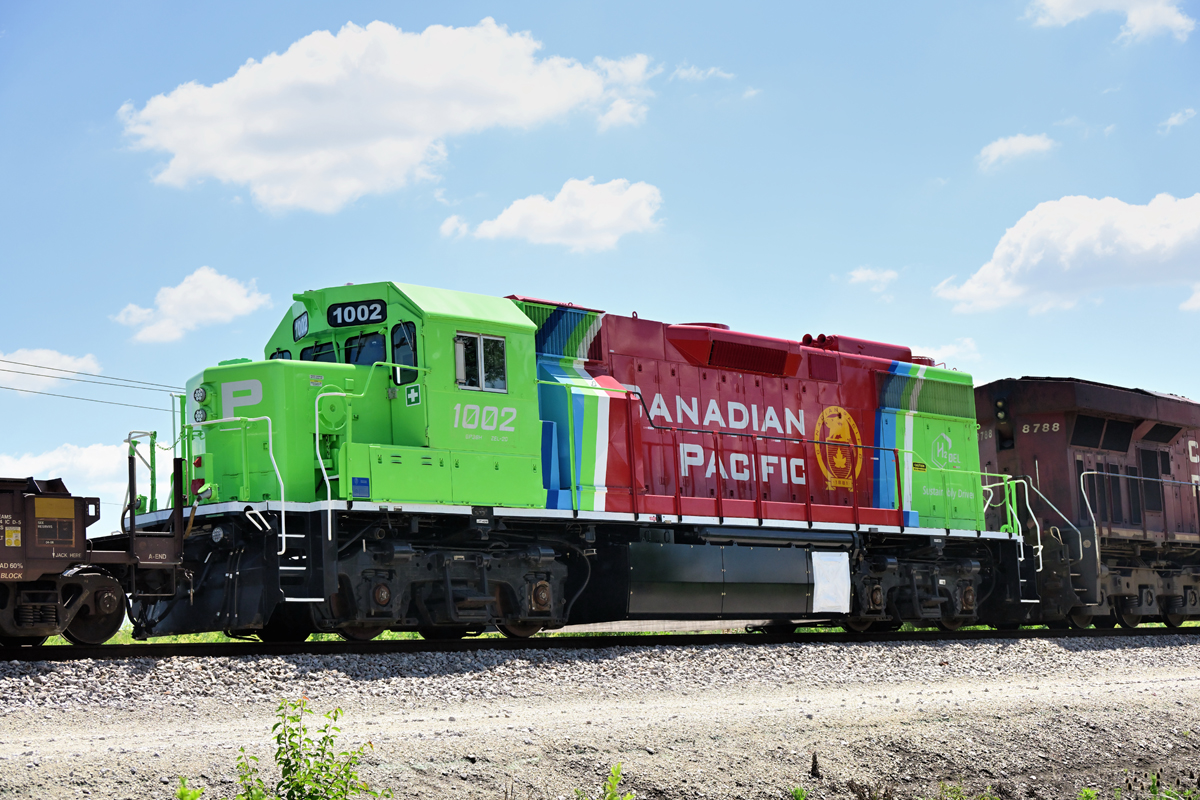
Union Pacific’s decision to challenge the Surface Transportation Board’s approval of the Canadian Pacific-Kansas City Southern merger is likely a last-ditch attempt to protect its cross-border traffic from upstart CPKC.
Last week UP asked a federal court to review the STB’s March 15 decision that allowed the CP-KCS merger to proceed on April 14 without any of the conditions UP had sought. Chief among them: UP had urged federal regulators to ensure that the merger would not undermine competition at the Laredo, Texas, gateway.
UP has by far the best access to Mexico. It’s the only railroad to serve all six of the major gateways. Roughly 11% of UP’s traffic moves to and from Mexico, with 41% of 2021 cross-border volume going via Laredo and 28% via the No. 2 gateway, Eagle Pass. So Laredo looms large for UP.
At Laredo, UP’s cross-border traffic has been exchanged with Kansas City Southern de Mexico at the single-track International Railway Bridge, where its tracks converge with Kansas City Southern’s. But now CPKC can provide single-line service between the Midwest and Mexico via Laredo — something that neither UP nor BNSF Railway can do. And UP stands to lose the most traffic to CPKC, according to the railroads’ merger application.
In objecting to the CP-KCS merger, UP outlined the importance of Laredo in a February 2022 filing with the STB:
The Laredo Gateway remains critical to UP and its customers. UP was never willing to rely on KCS’s vague commitment to keep the Laredo Gateway open “on commercially reasonable terms.” Over time, UP has worked with FXE to make the Eagle Pass Gateway a more attractive alternative for customers, in an effort to reduce reliance on KCS and the Laredo Gateway. UP has an additional incentive to encourage customers to route traffic via Eagle Pass whenever feasible: UP owns a 26% equity interest in FXE. Despite UP’s strong incentives, the Laredo Gateway’s share of UP traffic moving via the Laredo or Eagle Pass gateways in 2019 was 57%.
In addition, focusing on aggregate cross-border traffic flows understates the importance of the Laredo Gateway. For example, for the business CPKC is most focused on diverting — i.e.,finished vehicles, auto parts, and intermodal — the Laredo Gateway’s share of UP traffic moving via the Laredo and Eagle Pass gateways is approximately 62%. For traffic moving between the Upper Midwest and Mexican states in the industrialized heartland of northeastern and central Mexico, Laredo’s share of UP cross-border traffic in many cases exceeds 95%.
UP boasts the shortest route from Chicago to Laredo. At 1,438 miles, UP’s route is 19.9% shorter than CPKC’s 1,724-mile route via Kansas City. But the shoe is on the other foot south of the border. As UP explained to the STB, CPKC has two main advantages in Mexico:
First, KCSM serves many important points in Mexico exclusively, including Toluca, San Luis Potosí, and many locations in Nuevo Leon. Of the more than 300,000 cars and containers UP interchanged with KCSM in 2019, UP estimates that more than half moved between Laredo and locations served exclusively by KCSM. The overwhelming majority of the exclusively served traffic is the finished vehicle, auto parts, and intermodal business that CPKC is most focused on targeting for diversion.
Second, KCSM often has significant routing advantages for cross-border traffic, even when shippers have access to both KCSM and FXE. For example, KCSM and FXE both access shippers in the Valle de Mexico region surrounding Mexico City through a jointly owned railroad, Ferrocarril y Terminal del Valle de México. But FXE’s route from the Mexico City area to Eagle Pass is 55% (392 miles) longer than KCSM’s route to Laredo. Nearly 80% of UP’s traffic between the U.S. and the Mexico City area moves via the Laredo Gateway.
CP and KCS said they would keep the Laredo gateway open on commercially reasonable terms. But UP asked the board to impose enforceable measures to preserve competition. Among them: Requiring CPKC to provide rate quotes for both single-line and interline service via gateways and permitting UP to use the second railroad bridge now being built over the Rio Grande at Laredo.
In a statement that followed its initial court filing last week, UP said, “The merger of Kansas City Southern and Canadian Pacific is likely to reduce competition and negatively impact shippers and stakeholders. In approving the merger, the Surface Transportation Board acknowledged these concerns, but did not adopt solutions to remedy the harms.”
Yet the board did include a novel way of enforcing CPKC’s promise to not tamper with current interchanges.
To enforce CPKC’s gateway pledge, the merger decision requires the railroad to provide a shipper with a written justification for any interline rate increase that’s higher than the rate of inflation. CPKC also will be required to arbitrate gateway rate disputes with shippers, who rarely bring rate complaint cases to the STB because the agency’s processes are so complicated, expensive, and time-consuming.
STB Chairman Martin J. Oberman, speaking after the merger was approved, said the strength of gateway protections was unprecedented due to concerns that CPKC could manipulate its rates and crimp other railroads’ cross-border traffic at Laredo. If CPKC’s written explanation regarding a rate hike doesn’t pass muster with the shipper, Oberman says they’ll be able to challenge the rate on an expedited timetable.

That’s not what UP asked for, of course, and it will be up to the U.S. Court of Appeals for the District of Columbia Circuit to weigh UP’s claim that the STB erred in approving the merger. If the court sides with UP, the matter will be sent back to the STB for resolution. There’s no chance the CPKC merger will be undone. The only question will be whether the conditions are adequate.
You can’t blame UP for trying to protect its turf. But, oh, the ironies.
First, back in 1996 UP could have won the 50-year concession to operate Mexico’s Ferrocarril del Noreste, or Northeast Railroad. But it was badly outbid by then KCS CEO Michael Haverty and forever lost the opportunity to control what became KCS de Mexico.
Second, UP has never liked a merger that it’s not involved in — despite the fact that UP itself since 1980 has gobbled up Western Pacific, Missouri Pacific, Katy, Chicago & NorthWestern, and Southern Pacific.
Third, after losing Schneider and some Knight-Swift cross-border intermodal traffic to CPKC, UP teamed up with Canadian National and Ferromex on new Falcon Premium cross-border service linking Detroit and Canada with points in Mexico via Eagle Pass. It seems like we already have proof that competition is very much alive and well. May the best railroad win.
You can reach Bill Stephens at bybillstephens@gmail.com and follow him on LinkedIn and Twitter @bybillstephens














What a Crock UP is Just a Little Baby Wanting a Bottle and Crying over Spilled Milk Schneider and Knight Swift have a Multiple Agreement with CPKC just Get Over It and Move On
Any Jurist worth his/her salt will reject the case with extreme prejudice and send it to the STB. It’s their jurisdiction. Then if the UP still isn’t satisfied then bring it to court. This is a competition issue not an injury issue. UP isn’t injured.
Bill, are you one CPKC’s payroll? Just asking…
Sum it up in one word …
“Shakedown”
Sorry, I don’t buy the crocodile tears coming from UP. If you want an unobstructed gateway on your own terms, then build your own freaking bridge at Laredo and interchange there.
What UP is bellyaching about is when KCS started raising rates to get UP destined traffic up to their preferred route from Laredo. This essentially forced UP to discount their Laredo sourced traffic the rest of the way to the midwest to compensate for the rate increases.
This is what UP doesn’t like and finds “uncompetitive”. I laugh when I see railroads do this to others, but then complain when it happens to them.
Since crying to the STB didn’t work, and they don’t want to spend the money to do it their way, they go to court.
UP/FXE could easily build a Laredo bypass from the intermodal yard north of Laredo across the Rio Grande and build a yard right next to CPKCdM’s yard at Estacion Sanchez. UP would own the switching, UP would own the crossing and other than picking their customers freight up. They could even skip CPKCdM and build a line from Monterrey to Laredo. If 41% of my traffic was dependent on someone else, I would be looking for options under my control.
All a bit ironic given that CPKC is dependent upon UP to get to Laredo. 🙂
Ferromex does not serve Neuvo Laredo, Piedras Negras (Eagle Pass) is their eastern most border interchange.
But FXE does serve Monterrey, directly south of Laredo.
UP>under performing. Now they’re whining>UPWING…fly away UP. Your nothing more than a large barrel of sour grapes.
Everybody always takes shots at NUMBER ONE. UP is doing what everyone else does in these instances… try to get terms favorable to them. If they get them then they may keep and advantage. If they don’t, well they tried and you don’t get anything if you don’t try. And contrary to what Bill Stephens said about UP past mergers (Western Pacific, Missouri Pacific, MKT, Chicago & Northwestern, and Southern Pacific) they took over railroads that were not making money or providing adequate service and who came to them and saved the customers from loss of service or more bad service.
Don’t worry, UP will end up okay. I’m more worried about what could happen to CPKC in the United States if they can’t make this work. 31 Billion is a lot of coin to gamble with
If the up is so worried about competition then do what the free market does best out compete!!!!!! Or have they been on the opposite side of competition so long they have forgotten how to?
KCSM’s near monopoly and shorter routing clearly give CPKC the advantage in Mexico but UP needs to focus on their advantages in the US: shorter routing to Chicago and ownership of lines on which CPKC has only trackage rights.
The way things are going with the courts an politicians it may depend which politician or judge has the most stock in which railroad. As the old saying goes he who has the most WINS !
The federal court system has been filled with unqualified jurists over the last almost decade especially, so this case sadly could get traction…